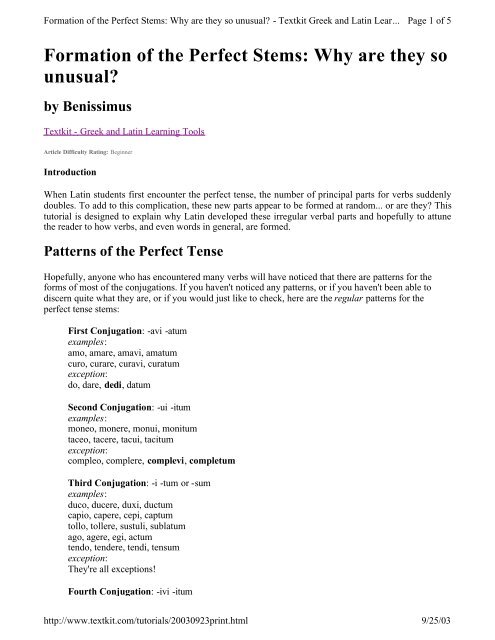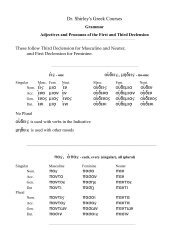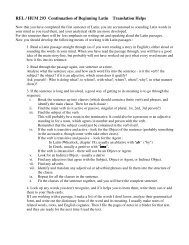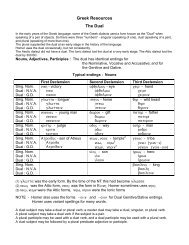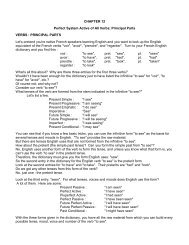Formation of the Perfect Stems: Why are they so unusual?
Formation of the Perfect Stems: Why are they so unusual?
Formation of the Perfect Stems: Why are they so unusual?
You also want an ePaper? Increase the reach of your titles
YUMPU automatically turns print PDFs into web optimized ePapers that Google loves.
<strong>Formation</strong> <strong>of</strong> <strong>the</strong> <strong>Perfect</strong> <strong>Stems</strong>: <strong>Why</strong> <strong>are</strong> <strong>the</strong>y <strong>so</strong> <strong>unusual</strong>? - Textkit Greek and Latin Lear...<br />
<strong>Formation</strong> <strong>of</strong> <strong>the</strong> <strong>Perfect</strong> <strong>Stems</strong>: <strong>Why</strong> <strong>are</strong> <strong>the</strong>y <strong>so</strong><br />
<strong>unusual</strong>?<br />
by Benissimus<br />
Textkit - Greek and Latin Learning Tools<br />
Article Difficulty Rating: Beginner<br />
Introduction<br />
When Latin students first encounter <strong>the</strong> perfect tense, <strong>the</strong> number <strong>of</strong> principal parts for verbs suddenly<br />
doubles. To add to this complication, <strong>the</strong>se new parts appear to be formed at random... or <strong>are</strong> <strong>the</strong>y? This<br />
tutorial is designed to explain why Latin developed <strong>the</strong>se irregular verbal parts and hopefully to attune<br />
<strong>the</strong> reader to how verbs, and even words in general, <strong>are</strong> formed.<br />
Patterns <strong>of</strong> <strong>the</strong> <strong>Perfect</strong> Tense<br />
Hopefully, anyone who has encountered many verbs will have noticed that <strong>the</strong>re <strong>are</strong> patterns for <strong>the</strong><br />
forms <strong>of</strong> most <strong>of</strong> <strong>the</strong> conjugations. If you haven't noticed any patterns, or if you haven't been able to<br />
discern quite what <strong>the</strong>y <strong>are</strong>, or if you would just like to check, here <strong>are</strong> <strong>the</strong> regular patterns for <strong>the</strong><br />
perfect tense stems:<br />
First Conjugation: -avi -atum<br />
examples:<br />
amo, am<strong>are</strong>, amavi, amatum<br />
curo, cur<strong>are</strong>, curavi, curatum<br />
exception:<br />
do, d<strong>are</strong>, dedi, datum<br />
Second Conjugation: -ui -itum<br />
examples:<br />
moneo, monere, monui, monitum<br />
taceo, tacere, tacui, tacitum<br />
exception:<br />
compleo, complere, complevi, completum<br />
Third Conjugation: -i -tum or -sum<br />
examples:<br />
duco, ducere, duxi, ductum<br />
capio, capere, cepi, captum<br />
tollo, tollere, sustuli, sublatum<br />
ago, agere, egi, actum<br />
tendo, tendere, tendi, tensum<br />
exception:<br />
They're all exceptions!<br />
Fourth Conjugation: -ivi -itum<br />
http://www.textkit.com/tutorials/20030923print.html<br />
Page 1 <strong>of</strong> 5<br />
9/25/03
<strong>Formation</strong> <strong>of</strong> <strong>the</strong> <strong>Perfect</strong> <strong>Stems</strong>: <strong>Why</strong> <strong>are</strong> <strong>the</strong>y <strong>so</strong> <strong>unusual</strong>? - Textkit Greek and Latin Lear...<br />
examples:<br />
audio, audire, audivi, auditum<br />
finio, finire, finivi, finitum<br />
exception:<br />
sentio, sentire, sensi, sensum<br />
your grammar/text may differ in <strong>the</strong> gender <strong>of</strong> <strong>the</strong> perfect passive or "fourth principle part" but <strong>the</strong><br />
gender is really irrelevant in this context.<br />
The first conjugation is <strong>the</strong> only class that is actually considered to have a regular paradigm, but with <strong>the</strong><br />
second and fourth, you will find that those listed as examples <strong>are</strong> by far <strong>the</strong> most commonly occurring<br />
forms. As you can see, <strong>the</strong> Third Conjugation really is full <strong>of</strong> irregularity in its perfect tense forms,<br />
except in that it will still always end in those certain sets <strong>of</strong> letters, as do all <strong>of</strong> <strong>the</strong> o<strong>the</strong>r conjugations.<br />
Therefore, this tutorial will mainly focus on how <strong>the</strong> Third Conjugation's perfect stem is formed.<br />
Understanding <strong>Why</strong> <strong>the</strong> Sounds Change: Part I<br />
There <strong>are</strong> very many rea<strong>so</strong>ns why a letter and <strong>the</strong> <strong>so</strong>und which it represents can mutate into <strong>so</strong>mething<br />
that seems completely foreign. These abnormalities occur in every word <strong>of</strong> <strong>the</strong> Third Conjugation, and<br />
occasionally in <strong>the</strong> o<strong>the</strong>r conjugations.<br />
The most drastic mutation, but al<strong>so</strong> a very r<strong>are</strong> one is suppletion, <strong>the</strong> collision <strong>of</strong> words. This is <strong>the</strong> case<br />
with just a handful <strong>of</strong> words, such as "tollo, tollere, sustuli, sublatum" in which half <strong>of</strong> <strong>the</strong> principle parts<br />
look completely alien to <strong>the</strong> o<strong>the</strong>r half. This is not by mere chance, but it is because two words which<br />
evolved separately from one ano<strong>the</strong>r have fused into one very strange word. It may not seem like such a<br />
strange thing for words to do when we realize that <strong>so</strong>me <strong>of</strong> our words, such as "go / went / gone" and<br />
"be / am / <strong>are</strong> / is / was / were / been" (that was a mouthful), <strong>are</strong> even more severe cases <strong>of</strong> this<br />
phenomenon.<br />
One <strong>of</strong> <strong>the</strong> more common types <strong>of</strong> change is <strong>the</strong> weakening <strong>of</strong> con<strong>so</strong>nants. It is very hard to pronounce a<br />
G correctly when we place it before certain letters such as T or S. Try saying "agtum" quickly and you<br />
will find that <strong>the</strong> natural inclination is to say <strong>so</strong>mething closer to "actum", which is <strong>the</strong> word that <strong>the</strong><br />
Romans preferred as well. So, with <strong>the</strong> word "ago, agere", we take <strong>the</strong> stem <strong>of</strong> <strong>the</strong> word ("ag-") and<br />
juxtapose <strong>the</strong> perfect passive ending (-tum), and receive <strong>the</strong> much fe<strong>are</strong>d "agtum"; we <strong>the</strong>n weaken <strong>the</strong><br />
G to a C and all becomes peaceful once again. You can observe this <strong>so</strong>rt <strong>of</strong> change quite <strong>of</strong>ten in verbs<br />
(and al<strong>so</strong> nouns and compound words), such as "rego, regere": we take "reg-" and add "-tum" which<br />
gives us "regtum", but we do not like this <strong>so</strong> we turn it into "rectum", which is indeed <strong>the</strong> fourth<br />
principle part <strong>of</strong> "rego, regere, rexi, rectum". This same exact rule applies to many o<strong>the</strong>r verbs, such as<br />
"intellego, intellegere" (see if you can guess what <strong>the</strong> fourth part will be if you don't already know).<br />
This is <strong>the</strong> way that con<strong>so</strong>nants <strong>are</strong> usually weakened in Latin:<br />
G becomes C<br />
D becomes T<br />
B becomes P<br />
Page 2 <strong>of</strong> 5<br />
"Scribo, scribere, scripsi, scriptum" is a perfect example <strong>of</strong> how <strong>the</strong> stem ending in B becomes P before<br />
certain con<strong>so</strong>nants.<br />
http://www.textkit.com/tutorials/20030923print.html<br />
9/25/03
<strong>Formation</strong> <strong>of</strong> <strong>the</strong> <strong>Perfect</strong> <strong>Stems</strong>: <strong>Why</strong> <strong>are</strong> <strong>the</strong>y <strong>so</strong> <strong>unusual</strong>? - Textkit Greek and Latin Lear...<br />
Understanding <strong>Why</strong> <strong>the</strong> Sounds Change: Part II<br />
Ano<strong>the</strong>r prevalent mutation <strong>of</strong> verbs within <strong>the</strong> Third Conjugation is <strong>the</strong> combination <strong>of</strong> letters. This<br />
combination is simply when a G, C, H, or a con<strong>so</strong>nantal V <strong>are</strong> placed before an S and become an X. It is<br />
very common in <strong>the</strong> Third Conjugation that <strong>the</strong> third principle part ends in -SI. Therefore, if <strong>the</strong> present<br />
stem <strong>of</strong> <strong>the</strong> verb ends in G, C, V or H, you should not be surprised if <strong>the</strong> third principle part suddenly<br />
has an X <strong>the</strong>re. The present stem <strong>of</strong> "duco, ducere" is "duc-"; to form <strong>the</strong> perfect stem we <strong>of</strong>ten (but not<br />
always) add an S to <strong>the</strong> present stem; <strong>so</strong> we take <strong>the</strong> stem "duc-", add an S and now we have "dux-".<br />
This explains why we have <strong>the</strong> parts "duco, ducere, duxi, ductum". Ano<strong>the</strong>r example we can find in<br />
"traho, trahere"; its stem is "trah-", we add an S, and we now have "trax-"; "traho, trahere, traxi,<br />
tractum" (H+S=X). To show how it works with a G, let's take "rego, regere"; <strong>the</strong> stem is "reg-", we add<br />
an S, and we have "rex-"; our forms <strong>are</strong> <strong>the</strong>n "rego, regere, rexi, rectum" (and this verb al<strong>so</strong><br />
demonstrates con<strong>so</strong>nant weakening in <strong>the</strong> fourth part). Try to predict <strong>the</strong> forms <strong>of</strong> <strong>the</strong>se verbs: "diligo,<br />
diligere" and "dico, dicere".<br />
There al<strong>so</strong> exists a type <strong>of</strong> change which just drops letters altoge<strong>the</strong>r, this is fairly common. We have <strong>the</strong><br />
word "mitto, mittere, misi, missum"; in this word, <strong>the</strong>re <strong>are</strong> two cases <strong>of</strong> omission. "Misi" is actually <strong>the</strong><br />
stem "mit-" (Latin doesn't end words in double con<strong>so</strong>nants, <strong>so</strong> "mitt-" is out <strong>of</strong> <strong>the</strong> picture) with an S<br />
added to <strong>the</strong> end to create "mits-", but for certain rea<strong>so</strong>ns, this was unacceptable, <strong>so</strong> <strong>the</strong> T was omitted.<br />
In <strong>the</strong> fourth part <strong>of</strong> <strong>the</strong> verb, we see almost <strong>the</strong> same thing: <strong>the</strong> stem "mit-" plus <strong>the</strong> ending "-sum", but<br />
instead <strong>the</strong> T is assimilated to S, which gives us "missum" (comp<strong>are</strong> this to how prefixes <strong>are</strong><br />
assimilated). There <strong>are</strong> al<strong>so</strong> verbs like "vinco, vincere, vici, victum" in which <strong>the</strong> N has probably just<br />
been lost in both <strong>of</strong> <strong>the</strong> perfect forms (to make <strong>the</strong>m... perfect?).<br />
Yet ano<strong>the</strong>r method <strong>of</strong> creating perfect stems is to simply maintain <strong>the</strong> present stem without adding an<br />
S. This can be seen in verbs like "tendo, tendere, tendi, tensum (tend-sum)" and "defendo, defendere,<br />
defendi, defensum (defend-sum)".<br />
With a few verbs, <strong>the</strong> vowels may weaken. There <strong>are</strong> many ways in which <strong>the</strong>y may change, <strong>the</strong>se <strong>are</strong> a<br />
few:<br />
An A may become an I<br />
An AE may become an I<br />
An E may become an I<br />
Page 3 <strong>of</strong> 5<br />
Just remember that in certain words, like "ago, agere, egi, actum" or "facio, facere, feci, factum", <strong>the</strong><br />
abnormal vowel in <strong>the</strong> third part is just a weakened A.<br />
http://www.textkit.com/tutorials/20030923print.html<br />
9/25/03
<strong>Formation</strong> <strong>of</strong> <strong>the</strong> <strong>Perfect</strong> <strong>Stems</strong>: <strong>Why</strong> <strong>are</strong> <strong>the</strong>y <strong>so</strong> <strong>unusual</strong>? - Textkit Greek and Latin Lear...<br />
Reference Tables<br />
Here is a compilation <strong>of</strong> most <strong>of</strong> <strong>the</strong> raw data that I have gone over in <strong>the</strong> article. This is no definitive<br />
re<strong>so</strong>urce, but hopefully it will serve useful for anyone who has not yet memorized <strong>the</strong> variations<br />
between related Latin words.<br />
Compound Con<strong>so</strong>nants<br />
Component 1 Component 2 Result Example<br />
C S X duco duxi (duc-si)<br />
V S X vivo vixi (viv-si)<br />
H S X traho traxi (trah-si)<br />
G S X rego rexi (reg-si)<br />
D or T S Z zona (d-<strong>so</strong>na)<br />
I listed Z <strong>so</strong>lely for <strong>the</strong> sake <strong>of</strong> how it is pronounced. Latin will never create a Z where a D or T is<br />
followed by an S, but it is still a dual con<strong>so</strong>nant consisting <strong>of</strong> those two letters, found usually, if not<br />
always, in words <strong>of</strong> Greek origin.<br />
Vowel Weakening<br />
Original Result Example<br />
A E ago egi (agi)<br />
A I capio accipio (ad-capio)<br />
AE I caedo cisum (caesum)<br />
E I lego diligo (di-lego)<br />
O U colo cultum (coltum)<br />
vowel weakening (and <strong>so</strong>metimes streng<strong>the</strong>ning) occurs differently when letters <strong>are</strong> in certain situations.<br />
You can look this up in a grammar (Wheelock's Latin has it in <strong>the</strong> appendix) or you can learn from<br />
experience how <strong>the</strong>se processes work.<br />
Con<strong>so</strong>nant Weakening<br />
Origin Mutation Example<br />
B+S P+S urbs (urps)<br />
B+T P+T obtineo (optineo)<br />
G+S C+S=X intellego intellexi (intelleg-si)<br />
G+T C+T pungo punctum (pung-tum)<br />
http://www.textkit.com/tutorials/20030923print.html<br />
Page 4 <strong>of</strong> 5<br />
9/25/03
<strong>Formation</strong> <strong>of</strong> <strong>the</strong> <strong>Perfect</strong> <strong>Stems</strong>: <strong>Why</strong> <strong>are</strong> <strong>the</strong>y <strong>so</strong> <strong>unusual</strong>? - Textkit Greek and Latin Lear...<br />
both "urbs" and "obtineo", as well as similar words, <strong>are</strong> pronounced but not spelled with a P.<br />
If you want to practice <strong>so</strong>me <strong>of</strong> what you have learned, I challenge you to explain <strong>the</strong> perfect tense<br />
forms <strong>of</strong> <strong>the</strong>se words, <strong>so</strong>me <strong>of</strong> which have and haven't been mentioned previously:<br />
lego, legere, legi, lectum<br />
bibo, bibere, bibi, --<br />
maneo, manere, mansi, mansum (second conj. that follows third declension formations)<br />
ludo, ludere, lusi, lusum<br />
cedo, cedere, cessi, cessum<br />
vivo, vivere, vixi, victum<br />
carpo, carpere, carpsi, carptum (about as close to regular as 3rd conj. gets!)<br />
suspendo, suspendere, suspendi, suspensum<br />
emo, emere, emi, emptum<br />
fugio, fugere, fugi, [fugitum*] (fugitum is not an actual word, but it is an implied form)<br />
Conclusion<br />
So now that you know why <strong>so</strong> many verbs have <strong>the</strong>se kinds <strong>of</strong> irregularities, you can go back into <strong>the</strong><br />
world and shock your friends and family with your newfound knowledge! Everyone is sure to be<br />
impressed, and <strong>the</strong>y will probably think you <strong>are</strong> very cool. Keep in mind that nei<strong>the</strong>r this tutorial nor any<br />
o<strong>the</strong>r <strong>so</strong>urce can actually teach you how to predict <strong>the</strong> present tense forms with regularity. However,<br />
with this knowledge, it is my hope that you will understand why <strong>the</strong> perfect tenses <strong>are</strong> as <strong>the</strong>y <strong>are</strong>.<br />
Amici amicaeque valete!<br />
<strong>the</strong> end.<br />
Copyright© Textkit.com 2003.<br />
Additional Re<strong>so</strong>urces<br />
Page 5 <strong>of</strong> 5<br />
If you <strong>are</strong> interested in studying fur<strong>the</strong>r into <strong>the</strong> evolution <strong>of</strong> Latin, I would suggest referring to a good,<br />
thick grammar. I recommend Allen and Greenough's "New Latin Grammar".<br />
http://www.textkit.com/tutorials/20030923print.html<br />
9/25/03


